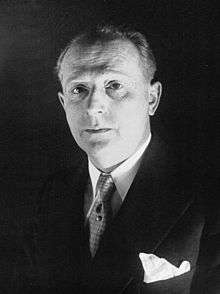Georges Weill
| Georges Weill | |
|---|---|
 Georges Weill – 1933 | |
| Member of Parliament for Alsace-Lorraine, Germany | |
|
In office 1912 – August 5, 1914 | |
| Member of Parliament for Bas-Rhin, France | |
|
In office May 11, 1924 – May 31, 1928 | |
|
In office May 8, 1932 – May 31, 1936 | |
| Personal details | |
| Born |
September 17, 1882 Strasbourg, Alsace-Lorraine, Germany |
| Died |
January 10, 1970 (aged 87) Paris, France |
| Political party | Social Democratic Party of Germany |
| Other political affiliations | French Communist Party |
| Parents | Elias and Melanie Weill |
| Military service | |
| Allegiance | France |
| Years of service | 1914–1918 |
| Battles/wars | World War I |
Georges Weill (September 17, 1882 – January 10, 1970) was an Alsatian politician who was a Socialist member of parliament for Metz in the German Reichstag from 1912 to 1915. After the outbreak of World War I, he declared his loyalty to France and joined the French Army. In response he was stripped of German citizenship August 5, 1914. After the Allied victory the provinces of Alsace-Lorraine returned to France, he was elected general counsel of the Lower Rhine in 1919 and became a socialist member of the French Parliament for the Bas-Rhin district.[1]
Early life
Georges Weill was born in 1882 to the merchant Elias Weill and his wife Melanie Weill Dreyfus in Strasbourg. He came from a bilingual family living in what was then the German controlled Alsace-Lorraine. He attended secondary school in Strasbourg, the Faculté des Lettres (Sorbonne) in Paris, the law and political science faculty of the University of Strasbourg and received his PhD in 1904 as Doctor of Political Sciences in Strasbourg with German economist Georg Friedrich Knapp. From 1900 to 1901 he was editor of the magazine Le Mouvement socialiste in Paris, 1902–1904 research assistant at the Chamber of Commerce in Strasbourg in 1905 editor of the Free Press in Strasbourg, 1906–1910 editor of the Franconian Daily Mail in Nuremberg. His writings got him in trouble and he frequently suffered fines due to press offenses and had two prison sentences.[2]
Political Life
From 1912 he was a member of the German Reichstag, for the Social Democratic Party of Germany (SPD), for the constituency of Alsace-Lorraine city of Metz.[3] He won the constituency against the previous mandate holder, the Lorraine protester Albert Grégoire, in the runoff election with the support of the Liberals.[4] He was with famed socialist Jean Jaurès when Jaurès was assassinated on July 31, 1914.[5] When war broke out in 1914 he joined the French Army on August 5 as an interpreter and publicly declared to stand on the side of France.[6][5] For joining the French he was stripped of his German citizenship and he lost his seat in the German Parliament.[5] The German SPD disavowed him.[5]
From 1924 to 1928 and from 1932 to 1936 he was a member of the French National Assembly. In 1928, he was in a runoff election with candidate Jean-Pierre Mourer. He was vice president of, the National Republican League (Ligue républicaine national), a party founded by the former French president Alexandre Millerand.[1] During the Second World War he lived in the French colony of Algiers. He died in Paris on January 10, 1970 at the age of 87.[1]
Bibliography
Notes
- 1 2 3 French National Assembly 2014
- ↑ Strauss 2002, p. 4133
- ↑ The Evening World 1914, p. 3
- ↑ German Imperial Statistical Office 1913, p. 103
- 1 2 3 4 The Ogden Standard 1914, p. 1
- ↑ The Daily Telegraph 1914, p. 6
References
- French National Assembly (2014). "Georges WEILL". French National Assembly. Retrieved December 22, 2014.
- German Imperial Statistical Office (1913). The Reichstag elections of 1912, Issue 2. Berlin: Verlag von Puttkammer & Mühlbrecht (in German) (1913 ed.). Statistics of the German Empire, Vol 250.
- Strauss, Léon & Charles Baechler (2002). Nouveau dictionnaire de biographie alsacienne, vol. 39 (in French).
- The Daily Telegraph (December 23, 1914). "Member of Reichstag Fighting for France". The Daily Telegraph. ISSN 0307-1235. OCLC 49632006. Archived from the original on December 23, 1914. Retrieved December 24, 2014.
- The Evening World (December 22, 1914). "Vorwaerts Condemns German Deputy's Act in Joining The French". The Evening World. ISSN 1941-0654. OCLC 9368601. Archived from the original on December 22, 1914. Retrieved December 25, 2014.
- The Ogden Standard (December 22, 1914). "German Socialist in French Army". Standard-Examiner. Ogden City, Utah. Archived from the original on December 22, 1914. Retrieved December 22, 2014.
External links
| Wikimedia Commons has media related to Georges Weill. |
- Eintrag Weill, Georg in der Datenbank der Reichstagsabgeordneten
- Biography of Georges Weill. In: Heinrich Best: Datenbank der Abgeordneten der Reichstage des Kaiserreichs 1867/71 bis 1918 (Biorab – Kaiserreich)
- Biography of Georges Weill. In: Wilhelm H. Schröder: Datenbank Sozialdemokratische Reichstagsabgeordnete und Reichstagskandidaten 1898–1918 (BIOKAND)
- Biography of Georges Weill. In: Wilhelm H. Schröder: Sozialdemokratische Parlamentarier in den deutschen Reichs- und Landtagen 1876–1933 (BIOSOP)